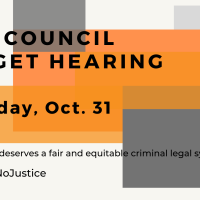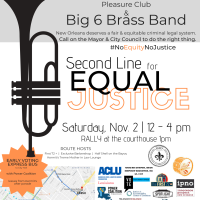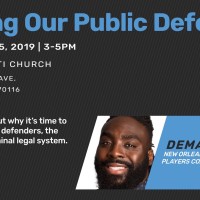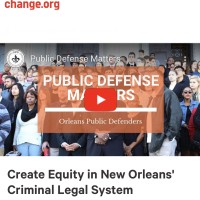Town Hall with New Orleans Saints & Players Coalition's Demario Davis
New Orleans Saints Lineback and Players Coalition member, Demario Davis, will host a Town Hall discussion, Tuesday, November 5 from 3-5pm at Corpus Christi Church, about the critical role of public defense in our justice system and the immediate need for equitable funding for OPD.
Pack the Chamber - City Council Budget Hearing
 Join us Thursday, October 31 at 10am for our budget hearing before the City Council. We will advocate for full and equitable funding for OPD and public defense. We are asking for 85% of the appropriation given to the DA be also given to OPD. This would allow us to more fully represent our clients and advocate for those facing the weight of the criminal legal system.
Join us Thursday, October 31 at 10am for our budget hearing before the City Council. We will advocate for full and equitable funding for OPD and public defense. We are asking for 85% of the appropriation given to the DA be also given to OPD. This would allow us to more fully represent our clients and advocate for those facing the weight of the criminal legal system.
Demario Davis: New Orleans not giving criminal defendants what they need
The Advocate: Saints' Demario Davis: New Orleans not giving criminal defendants what they need.
As you walk up the steps of the Orleans Parish Criminal Courthouse, you see engraved above the entrance, “The impartial administration of justice is the foundation of liberty.” But the city’s persistent refusal to sufficiently fund the office responsible for protecting people’s liberty has prevented the impartial administration of justice in Orleans Parish from becoming a reality.
For years, the Orleans Public Defenders Office has moved from one budget crisis to another. In 2012, funding shortfalls forced OPD to lay off a third of its staff. Three years later, and severely short-staffed, OPD had to refuse cases and waitlist people because it could no longer provide each person with the constitutional right to effective assistance of counsel.
Open Letter to Mayor Cantrell to Equitably Fund New Orleans' Criminal Legal System
We recently submitted an Open Letter to Mayor Cantrell, urging her to prioritize equity in our criminal legal system and fully commit to a fair and just system by equitably funding OPD and public defense in New Orleans. The letter was signed by more than two dozen community organizations, members and leaders.
Sign Our Petition for an Equitable Criminal Legal System
We're fighting for a more fair and just criminal legal system in New Orleans. Help us get there by telling our city leaders to prioritize public defense and equitable resources and funding. Justice depends on it.
OPD Hosts 4th Annual Second Line for Equal Justice
We will once again join together with our community, our partners and allies in justice reform for our 4th annual Second Line for Equal Justice.
 Focusing on a fair and equitable criminal legal system, we will call on New Orleans' decisionmakers and leaders to create equity in funding and resources between OPD and the District Attorney. For too long, New Orleans' criminal legal system has tipped too heavily in favor of arrest, prosection and incarceration.
Focusing on a fair and equitable criminal legal system, we will call on New Orleans' decisionmakers and leaders to create equity in funding and resources between OPD and the District Attorney. For too long, New Orleans' criminal legal system has tipped too heavily in favor of arrest, prosection and incarceration.
Make plans to join us on Saturday, November 2! For more information, check out the Facebook event page.
Want to get involved and join us? Reach out to Lindsey Hortenstine.




